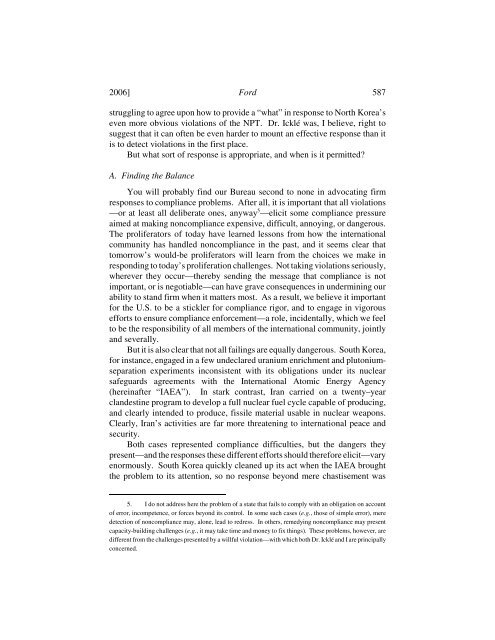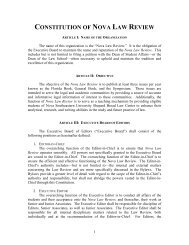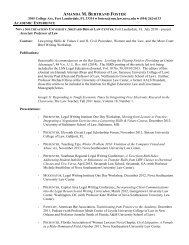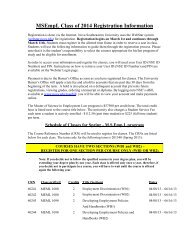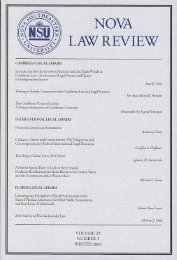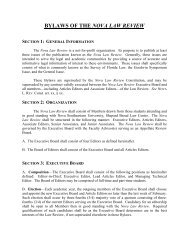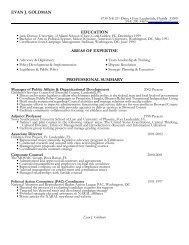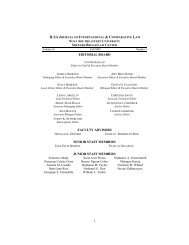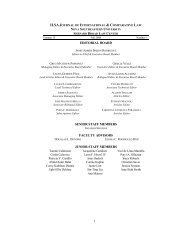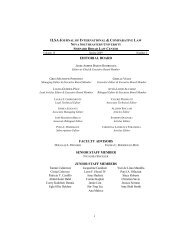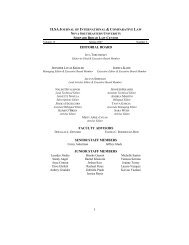Volume 12:2 - Shepard Broad Law Center - Nova Southeastern ...
Volume 12:2 - Shepard Broad Law Center - Nova Southeastern ...
Volume 12:2 - Shepard Broad Law Center - Nova Southeastern ...
You also want an ePaper? Increase the reach of your titles
YUMPU automatically turns print PDFs into web optimized ePapers that Google loves.
2006] Ford 587struggling to agree upon how to provide a “what” in response to North Korea’seven more obvious violations of the NPT. Dr. Icklé was, I believe, right tosuggest that it can often be even harder to mount an effective response than itis to detect violations in the first place.But what sort of response is appropriate, and when is it permitted?A. Finding the BalanceYou will probably find our Bureau second to none in advocating firmresponses to compliance problems. After all, it is important that all violations—or at least all deliberate ones, anyway 5 —elicit some compliance pressureaimed at making noncompliance expensive, difficult, annoying, or dangerous.The proliferators of today have learned lessons from how the internationalcommunity has handled noncompliance in the past, and it seems clear thattomorrow’s would-be proliferators will learn from the choices we make inresponding to today’s proliferation challenges. Not taking violations seriously,wherever they occur—thereby sending the message that compliance is notimportant, or is negotiable—can have grave consequences in undermining ourability to stand firm when it matters most. As a result, we believe it importantfor the U.S. to be a stickler for compliance rigor, and to engage in vigorousefforts to ensure compliance enforcement—a role, incidentally, which we feelto be the responsibility of all members of the international community, jointlyand severally.But it is also clear that not all failings are equally dangerous. South Korea,for instance, engaged in a few undeclared uranium enrichment and plutoniumseparationexperiments inconsistent with its obligations under its nuclearsafeguards agreements with the International Atomic Energy Agency(hereinafter “IAEA”). In stark contrast, Iran carried on a twenty–yearclandestine program to develop a full nuclear fuel cycle capable of producing,and clearly intended to produce, fissile material usable in nuclear weapons.Clearly, Iran’s activities are far more threatening to international peace andsecurity.Both cases represented compliance difficulties, but the dangers theypresent—and the responses these different efforts should therefore elicit—varyenormously. South Korea quickly cleaned up its act when the IAEA broughtthe problem to its attention, so no response beyond mere chastisement was5. I do not address here the problem of a state that fails to comply with an obligation on accountof error, incompetence, or forces beyond its control. In some such cases (e.g., those of simple error), meredetection of noncompliance may, alone, lead to redress. In others, remedying noncompliance may presentcapacity-building challenges (e.g., it may take time and money to fix things). These problems, however, aredifferent from the challenges presented by a willful violation—with which both Dr. Icklé and I are principallyconcerned.


